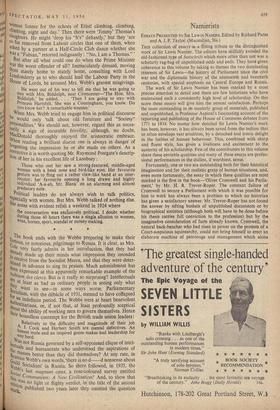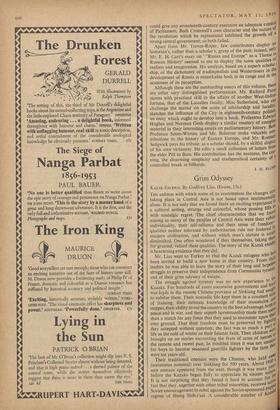Namierists
ESSAYS PRESENTED TO SIR LEWIS NAMIER. Edited by Richard Pares and A. J. P. Taylor. (Macmillan, 36s.)
Tuts. collection of essays is a fitting tribute to the distinguished work of Sir Lewis Namier. The editors have skilfully avoided the old-fashioned type of festschrift which more often than not was a scholarly rag-bag of unpublished odds and ends. They have given coherence to this volume by taking as themes the two dominating interests of Sir Lewis—the history of Parliament since the civil war and the diplomatic history of the nineteenth and twentieth centuries, with special emphasis on Central Europe and Russia.
The work of Sir Lewis Namier has been marked by a most precise attention to detail and there are few historians who have maintained such a consistently high level of scholarship. On this score these essays will give him the utmost satisfaction. Perhaps the most outstanding in its masterly grasp of materials, published and unpublished, is Professor Aspinal's fascinating account of the reporting and publishing of the House of Commons debates from 1771 to 1834. No matter how detailed Sir Lewis Namier's work has been, however, it has always been saved from the tedium that so often envelops vast erudition, by a detached and ironic delight in the foibles of human behaviour. This, combined with sharp and fluent style, ,has given a liveliness and excitement to the austerity of his scholarship. Few of the contributors to this volume share these enviable qualities and many of these essays are profes- sional performances in the dullest, if worthiest, sense.
Fortunately, one or two are outstanding both for their historical imagination and for their realistic grasp of human situations, and, even more fortunately, the essay in which these qualities are most marked is the first in the book—'Oliver Cromwell and his Parlia- ment,' by Mr. H. R. Trevor-Roper. The constant failure of Cromwell to secure a Parliament with which it was possible for him to work has always been a problem to which no historian has given a satisfactory answer. Mr. Trevor-Roper has not found the answer by sifting bushels of unpublished documents or by biographical statistics (although both will have to be done before his thesis carries full conviction to the profession) but by the imaginative consideration of facts already known. Cromwell, the natural back-bencher who had risen to power on the protests of a Court-suspicious squirearchy, could not bring himself to erect an elaborate machine of patronage and management which alone could give any seventeenth-century executive an adequate control of Parliament. Both Cromwell's own character and the nature Of the revolution which he represented inhibited the growth of 3 strong central government; so, both failed. Apart from Mr. Trevor-Roper, few contributors display an historian's, rather than a scholar's, grasp of the past; indeed, only Mr. E. H. Carr's essay on ` "Russia and Europe" as a Theme in Russian History' seemed to me to display the same qualities of realism and imagination. His analysis, based on a superb scholar. ship, of the dichotomy of traditipnalists and Westernisers in the development of Russia is remarkable both in its range and in the acuteness of its perception. Although these are the outstanding essays of this volume, there are other very distinguished performances. Mr. Richard Pares moves with practised skill in the affairs of another West-Indian fortune, that of the Lascelles family; Miss Sutherland, who can challenge the master on the score of schblarship and luciditY, sketches the influence of the City in eighteenth-century politics,' an essay which ought to develop into a book. Professors Edward Hughes and Norman Gash display a similar mastery of comPlex material in their interesting essays on parliamentary history. Both Professor Seton-Watson and Mr. Bolsover make valuable COn' tributions to the history of Eastern Europe, and Mr. Romney Sedgwick pays his tribute, as a scholar should, by a skilful display of his own virtuosity. He edits a small collection of letters from the elder Pitt to Bute. His contribution has the neatness, the con' ning, the disarming simplicity and mathematical certainty of $ controlled break at billiards.
I. H. PLIO



































 Previous page
Previous page